Donald "Jim" Stiffler
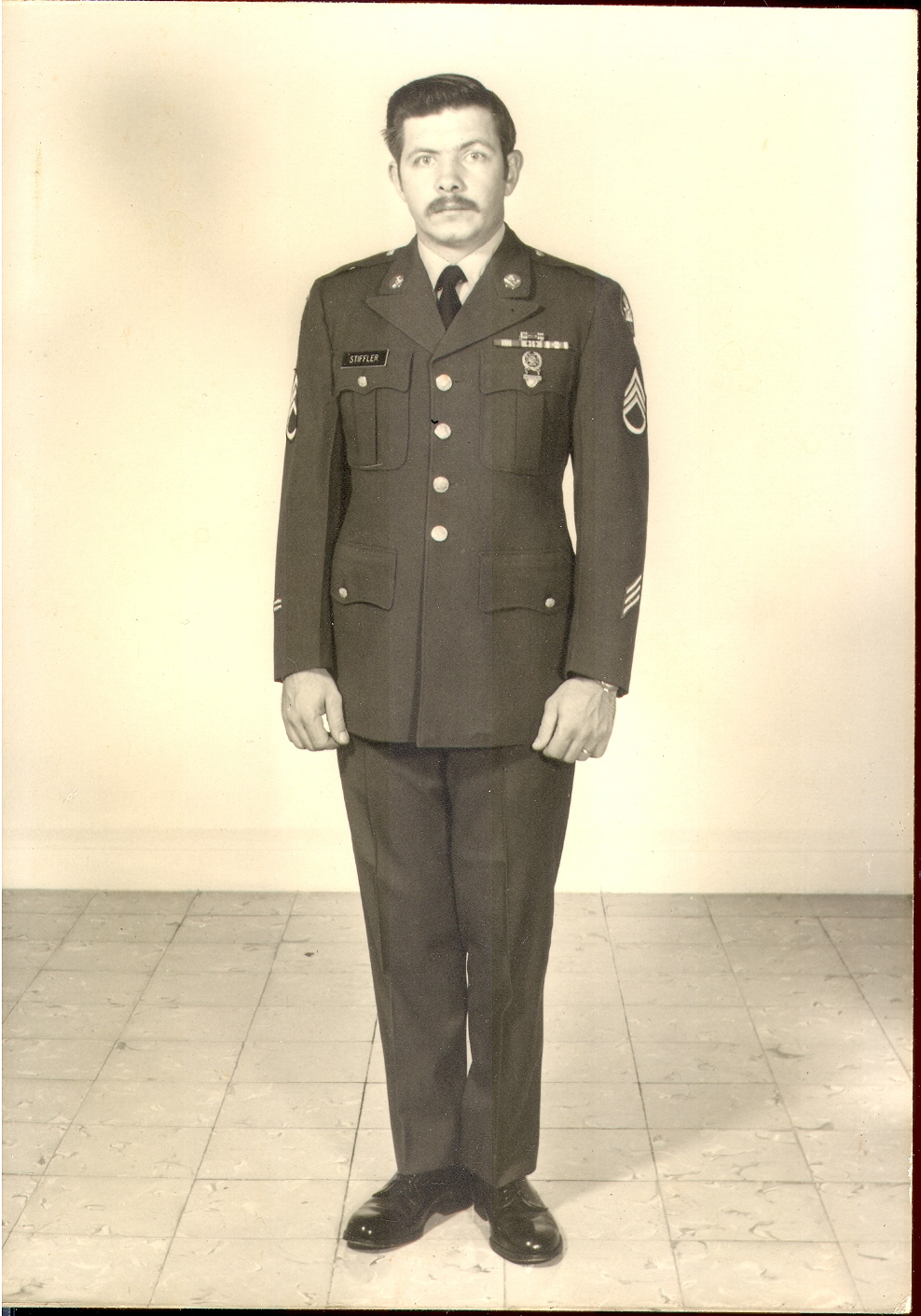

Before enlisting in the army, what was your life like?
I was going to school and working part time...just fooling around like any other teenage boy would be and getting into trouble and stuff like that.
When did you decide to enlist in the army?
Well I was in a little bit of trouble and a judge said that it would be better if I went to jail or to the army, and I chose the army.
How old were you at the time?
I was sixteen, in March just before my seventeenth birthday.
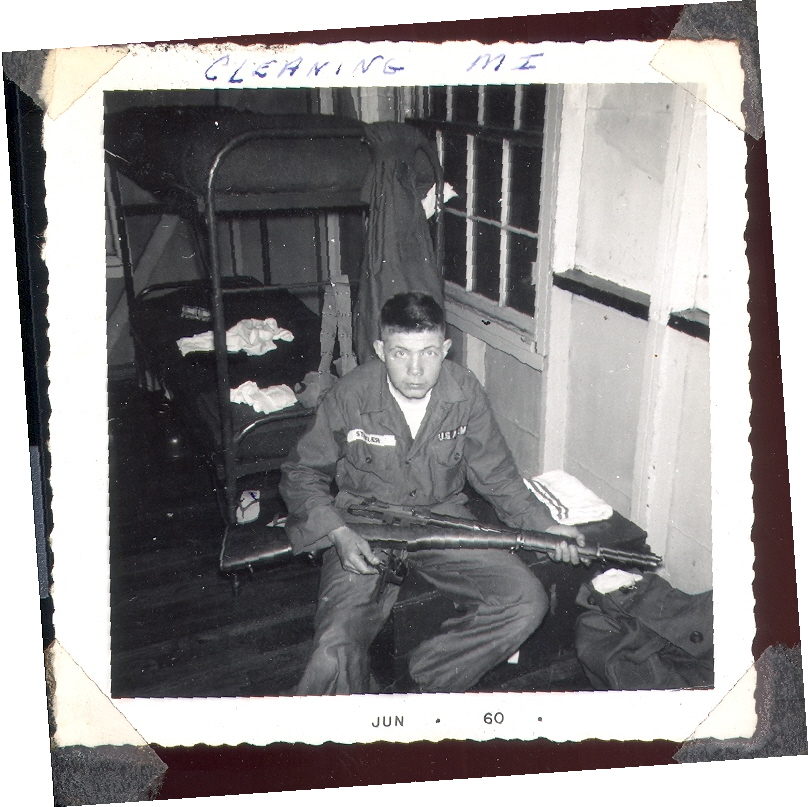
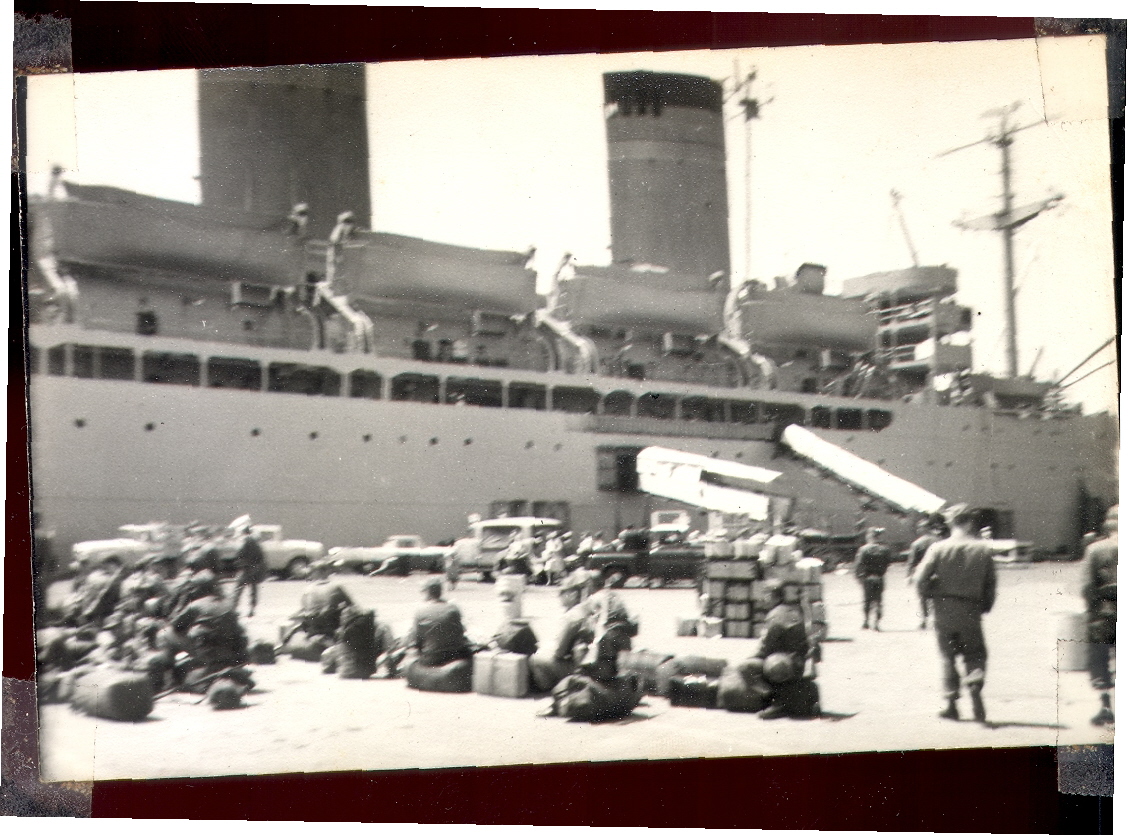
How did your family take to you making that decision?
My mother wasn't very happy with it and my dad really didn't care, but after a while my mother grew to understand why I did it.
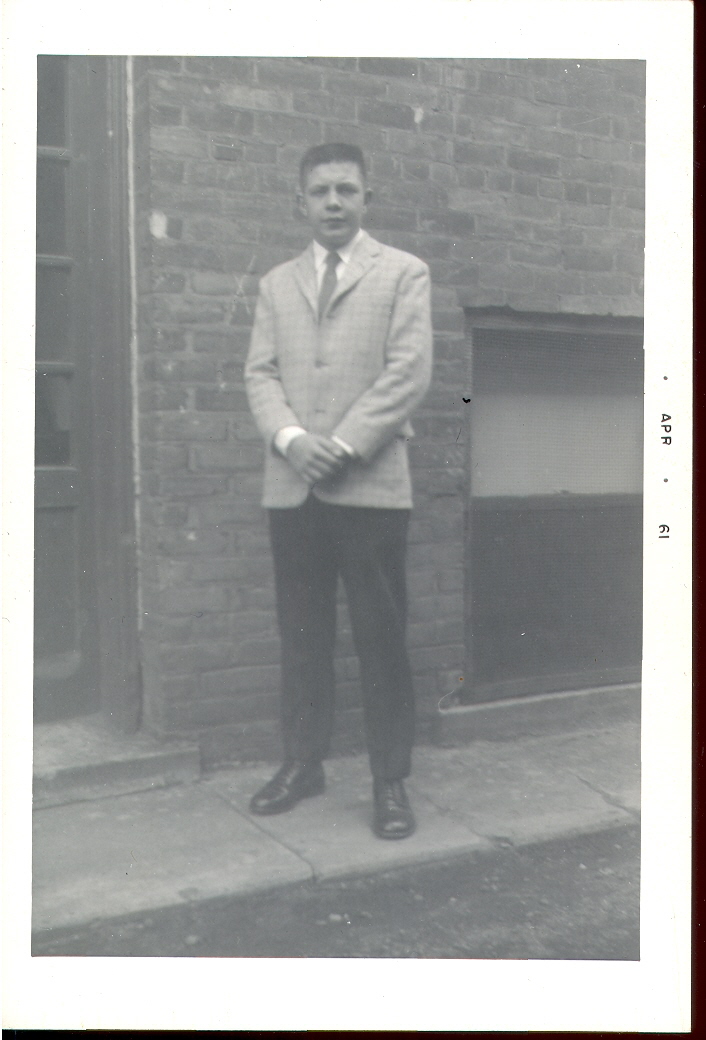
How was the basic training once you were in the army?
Well it wasn't really too bad, it was tough, but I was playing football in high school so I was ready for it,so it made it a little easier,
than some of them other guys...some of those guys were sittin' around on their hind ends all the time they didn't get a chance to have any physical
activity so it was really bad on them. But, it was tough, there were many nights when I was "oh man I'm glad this day's over." And that was basic
(training), and in AIT was really tough 'cause I went to airborne training in Fort Campbell, Kentucky and as soon as that bus stopped some big, ugly
DI (drill instructor) would jump in your face and we ran everywhere we went we had to run. When I got off the bus I started runnin' and I didn't stop
right until I got back on the bus to leave. (Laughs)
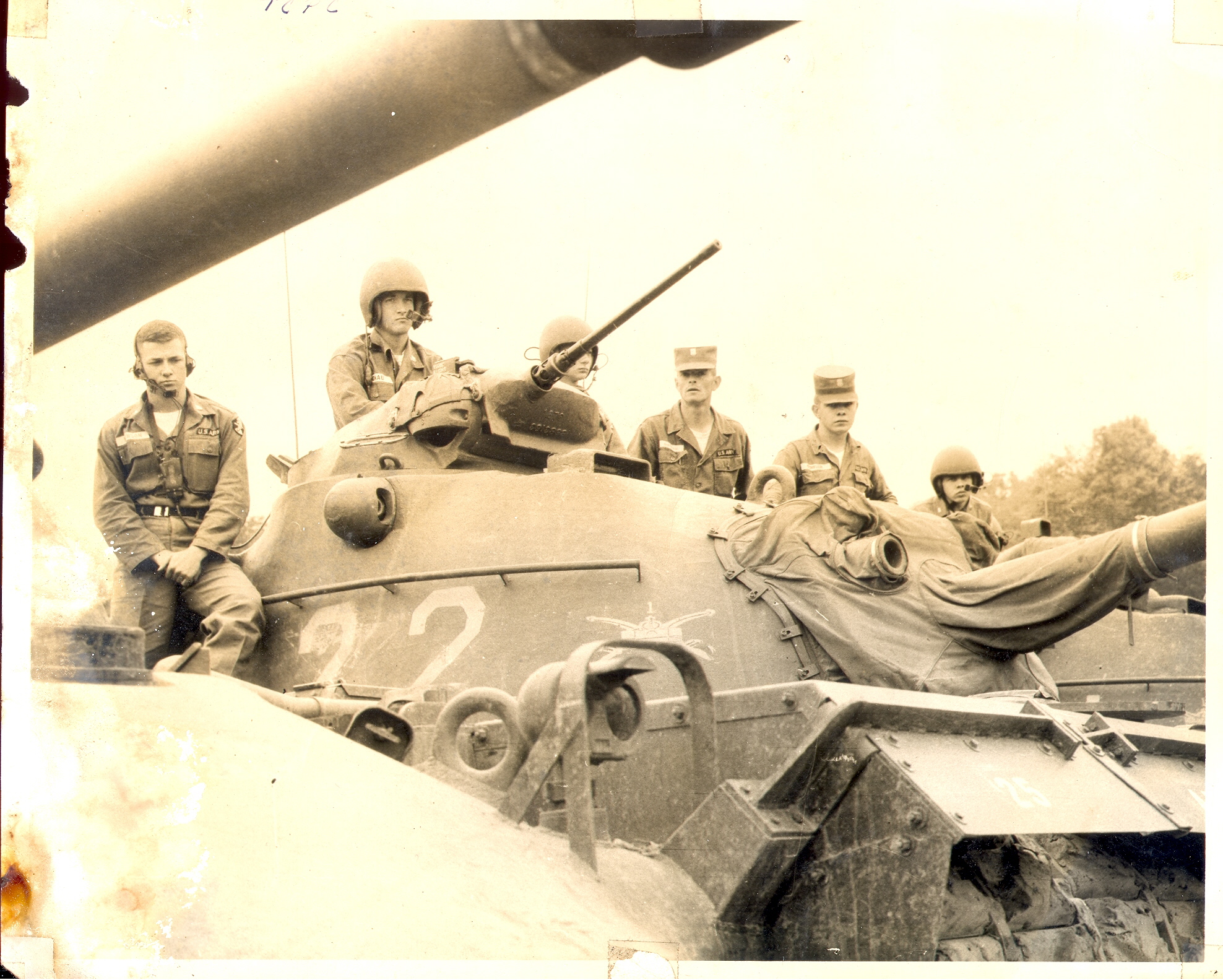
How long was it until the beginning of the war?
The war started in 1959, really, as far as the United States was involved in it, they didn't start sending a lot of people over there until 1965.
So I guess you could say that 1965 was the big push and pushing a lot of troops in.
How was the trip on the way to Vietnam?
I was scared ....'cause we didn't know what was gonna happen, we were trying to think back, you know, when our dads and uncles and stuff like that
that went to Korea and the Second World War and all those places. But, it was nothing like that, I imagined the WWII and Korea when those guys were fighting
over there in southeast Asia, on those Asian countries were the people over there had no regard for life, it was a daily thing, dying, so they had no respect
for life where we do and it was scary. It took us thirty days to get there, on that ship, yeah.
When you arrived, where were you stationed?
Umm...we weren't stationed anywhere we were just...see I was just assigned to a detachment...there was thirty of us but we were broken up into three teams,
ten man teams. And then we were farmed out to different units that needed combat engineers, so they broke us all up, we weren't really assigned anywhere.
When the war began, what was your rank/title?
I was a combat engineer, a corporal.
When you were in Vietnam did you keep in touch with any family members?
They knew where we were, and what country we were in. There wasn't too much communication, only letters and stuff like that and once in a great while we could
get a phone call. Yeah we'd make them in what they called back then was a "mars" station and we'd talk over a CB radio. Just through letters, mostly, at the time the
the only phone call I ever made ...well I made two while I was there. The mars station were far and few between and we were always out in the bush somewhere. And the
calls were just to my wife at the time. My mother and my aunt was through letters. There was no postage, where you put the stamp now we would just write free there
and it would go straight through. We wrote on everything from box top lids to regular writing paper.
What were some of your duties?
We repaired equipment, we blew up equipment, we set charges to blow up bridges, we'd dig up bombs that hadn't exploded, we'd then detonate them so they wouldn't
hurt any of the locals, and we were just assigned to whoever needed combat engineers.
What type of food did you eat?
Mainly C Rations, unless we could find something else, local vegetables, meat, and stuff like that. Probably wasn't too smart, but we ate downtown sometimes if we'd
find a place to eat. They had restaurants, you know, but it wasn't like here, you couldn't drive up to Wendy's. Some of the cities had restaurants; of course we never got
to see many of those, but some of these little villages had restaurants. The main thing we ate was water buffalo, steaks, and...umm monkey meat, a lot of vegetables and
fruits and stuff like that. But, mainly C rations.
How often were you able to bathe and keep up with yourself hygienically?
Heh...soemtimes we'd go for two or three weeks without a bath. We'd wash out your helmet or whatever or find a nice little stream. We'd take baths in the river or
creek or whatever, until we got back to base camp and they'd have like a shower unit set up. The water though, they only had so much so they had to filter clean it, and
you probably showered with some dirty water that some other guy just showered with.
But I bet you didn't care about the dirty water, right?
Not as long as we got a bath, that was the main thing.
What kind of injuries did you sustain in the war?
Well we were jumpimg into
Plei Me, Vietnam with the 173rd airborne, and on the way down I took a round in the leg. That was in 1965. In '66 we
were in
Pleiku and we were
coming back from a mission and apparently the Vietong had regrouped behind us and we were hit with an RPG and I got some shrapnel in my leg. An RPG is a rocket propelled grenade,
it's a sound you'll never forget.
How long did these injuries incapacitate you?
It didn't, I just kept pushin', we had a mission and we had to get out of there. The medic would come over and kind of patch me up a little bit. We had to go out into the
field and recover some equipment. Then after we got all that done and got the area secure, I went back to the medics, and THEN the pain started. There was too much adrenaline at
the time I couldn't feel it, apparently it was a tracer round that it me because it seared all the way through my leg so there wasn't much blood. The shrapnel wasn't too bad at all,
it hit me in my calf, it was just a stinging pain I imagine 'cause it was hot. I fared real well compared to some other guys.
What did you think about that helped you keep your head during the war?
The government set up a time frame for each unit, and knowing that your time to leave was coming up kept you going. In WWII, if you were sent over to Germany or wherever you
were there until the war was over. We had the oppurtunity to have in our mind that in six months from today I'm going home. And each other, you had your buddies.
Are there any particular relationships you remember from the war?
Oh yeah......two of 'em aren't here anymore. My best friend, he got shipped back to back to Hawaii. The three guys I was closest to, only one of them is left.
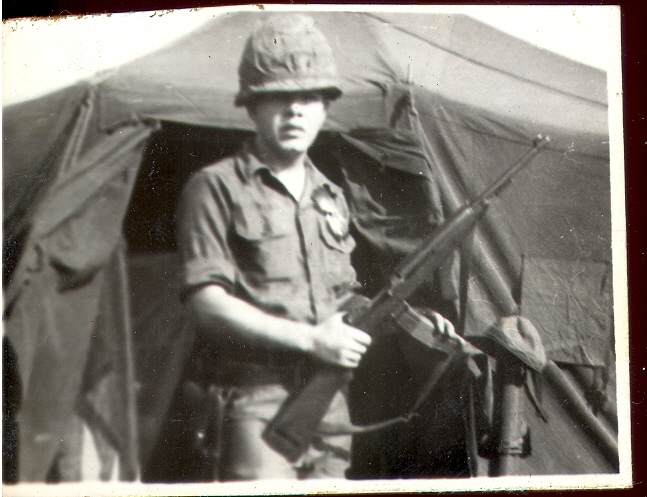
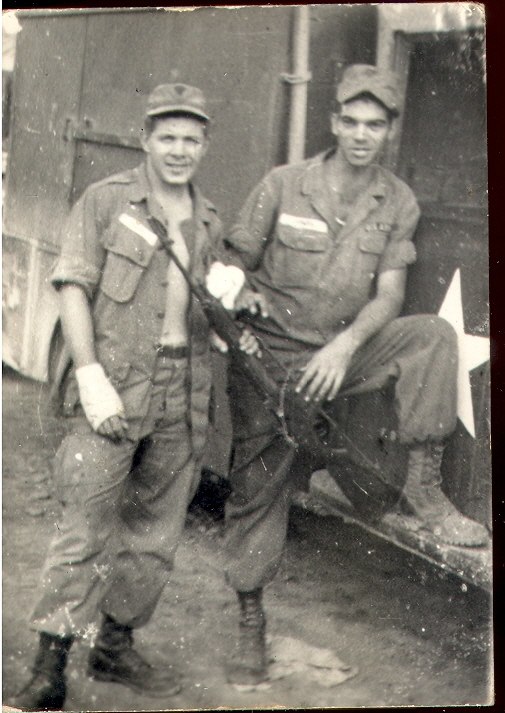
Did they pass in combat or after the war?
No they died right there in the jungle. John Dreyer, and a guy wer called Rich, his last name was Richardson but everybody called him Rich.
Do you have any good memories from the war?
Yeah. Helping out the people, and saving little kids. Teaching them that we weren't animals. They were taught that we were animals and we just came there to devour them so to
speak. At base camp, I used to help out a Vietnamese teacher. I'd help them with English work, helping them teach the kids English.

You also told me about a another special friend during that time, who was he?
Yeah. His name was Sh*tandstuff. We named him that because that's all he did. We found him in a trash dump. We were going by this area and we were dumping out some trash, and
he was just wandering around out the area looking for something to eat I guess. I kind of felt sorry for him and I took him back and he was just loaded with lice and ticks and fleas.
He was a mess, we poured oil all over him and let it soak for a couple of hours and that killed most them. After that he was friend, everywhere I went he went. I carried him in my
pocket, and he never made a sound. He went on some deadly fights with us and he made it through.
Did you ever think about what you were going to do once you came home?
Yeah, I wasn't going back. That was my number one priority, because I had already spent two tours there.
What were some of the things you did your first day back in the U.S.?
I drank two gallons of milk. I went two years without a glass of milk. After I drank all that milk, then I went to a real bathroom...hahahaha...I used a real restroom, not a latrine
or a trench or anything like that...it was nice. I took a forty five minute HOT shower, and I got some decent and clean clothes. Then, I got on a plane and flew home to my family.
Did you benefit from the G.I. Bill?
Yeah, I got my college degree through them, and got an associate's degree in teaching, and they helped me buy houses and stuff like that.
What do you think you did differently in your life that placed you where you are today, unlike other Vietnam veterans that are homeless today?
Well the main thing with me is...that I left it over. Talking with some of those guys, they can't let go. We were over there not against our will, but against our country's will. At the
time we didn't know that, but then when we heard reports from the news that everybody was against us, even our own people back in the United States, and I think a lot of that worked on them.
When those guys came home, they let it get to them. Maybe it was because I was fortunate enough that I didn't see as much action as some of those guys. I think the key thing was that they
brought it back with them, and they live it everyday. I mean I talk to them, and they're still there. And that's the reason they can't hold a job or whatever, but they just live that stuff
everyday and they can't get it out of their mind. To me that's how I dealt with it, I had a rough time my first year back, but the main thing of it was is that I had to let it go. I think being
treated bad by your own people was the worst part.
Did it make you feel like it was all for nothing when you treated that way by Americans?
Exactly.
Is there anything else you would like to add?
The only thing I would like to add is...don't treat the guys coming back from Iraq the way they treated us, and if you'd like to publish that on the world wide web you can quote me.
The History Place. Copyright © 2006 The History Place™ All Rights Reserved. The History Place presents a fact-based, common sense approach in the presentation of the history of humanity, with great care given to accuracy. http://www.historyplace.com/ Last Updated: July 3, 2006.
Vietnam War. Wikipedia has rapidly grown into the largest reference website on the Internet, and is written collaboratively hby people all around the world. This website is wiki, which means that anyone can edit, correct, or improve information throughout the encyclopedia, simply by clicking the edit this page link. http://en.wikipedia.org/wiki/Vietnam_War. Last Updated: July 3, 2006.
Yahoo!Education Copyright 2005 Yahoo! Inc. All rights reserved.Yahoo! Education is a website especially for school and educational searches. http://education.yahoo.com/reference/encyclopedia/entry/VietnamW
Language of War. PBS is a trusted community resource and uses the power of noncommercial television, the Internet and other media to enrich the lives of all Americans through quality programs and education services that inform, inspire, and delight. http://www.pbs.org/wgbh/amex/vietnam/trenches/laguage.html. Last Updated on March 29, 2005.
Nelson, Cary. About the Vietnam War (1960-1975) http://www.english.uiuc.edu/maps/vietnam/vietnamwar.htm
C-Rations. Copyright 2005. http://www.webewebbiers.com/vietnam/c-rations.htm